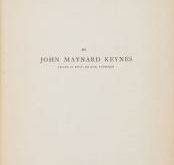from deshoebox But mainstream economics must be defended. It must! Can you even imagine what might happen if it were successfully challenged? If people started to doubt the god-like efficiency of markets, the exquisite perfection of economic equilibria, the flawless functioning of billions of transactions conducted on the basis of full information and rational expectations? If people began to ask, “What is the economy really for? What is it supposed to be doing?” and if the new economists...
Read More »Economists like Krugman, Wren-Lewis or Stiglitz are nothing but die-hard defenders of mainstream economics.
from Lars Syll When politically “radical” economists like Krugman, Wren-Lewis or Stiglitz confront the critique of mainstream economics from people like me, they usually have the attitude that if the critique isn’t formulated in a well-specified mathematical model it isn’t worth taking seriously. To me that only shows that, despite all their radical rhetoric, these economists – just like Milton Friedman, Robert Lucas Jr or Greg Mankiw – are nothing but die-hard defenders of mainstream...
Read More »Four structural characteristics of the US economy
from Dimitri Papadimitriou, Michalis Nikiforos, and Gennaro Zezza In order to understand the US economy – or for that matter any economy – we need to identify its structural characteristics. These characteristics will allow us to link its precrisis trajectory to the present relatively slow recovery and, most importantly, its future prospects. Through this prism, it is also easier to understand major policy debates and concerns regarding foreign competition, such as the recent...
Read More »The validity of statistical induction
from Lars Syll In my judgment, the practical usefulness of those modes of inference, here termed Universal and Statistical Induction, on the validity of which the boasted knowledge of modern science depends, can only exist—and I do not now pause to inquire again whether such an argument must be circular—if the universe of phenomena does in fact present those peculiar characteristics of atomism and limited variety which appear more and more clearly as the ultimate result to which material...
Read More »MMT Macro Final (2/3)
from Asad Zaman Last semester I taught an MMT-based Macro course which attempted to re-integrate history into economics. The course was based on the premise that economic theories cannot be understood outside the historical context in which they were born. Standard graduate macro courses attempt to teach a body of theory which has been empirically falsified. My course had the goal of giving the student the ability to understand major economic events of the past century. A previous post...
Read More »The necessity to change the rules of the current economic system is quite obvious.
from Ikonoclast Conventional economics is a prescriptive discipline pretending to be a descriptive discipline. I find it useful, at a first principles level of thinking, to distinguish between “rules” and “laws”. (1) A “rule” is a prescribed guide for conduct or action by any agent (human or machine). (2) A “law” is a fundamental law of (physical) nature described by the hard sciences after extensive observation, experiment, deduction and mathematical analysis. A “rule” is made in a given...
Read More »Two must-read statistics books
from Lars Syll Mathematical statistician David Freedman‘s Statistical Models and Causal Inference (Cambridge University Press, 2010) and Statistical Models: Theory and Practice (Cambridge University Press, 2009) are marvellous books. They ought to be mandatory reading for every serious social scientist — including economists and econometricians — who doesn’t want to succumb to ad hocassumptions and unsupported statistical conclusions! How do we calibrate the uncertainty introduced by...
Read More »Colonialism’s mindset planted the seeds of today’s climate crisis
from Jamie Margolin and The Guardian Many people trace the origins of today’s climate crisis to the Industrial Revolution, when humans first began to burn large amounts of coal, but the crisis’s true roots extend further back to the onset of colonialism. When European colonizers ventured to Africa, Asia, North and South America, they invariably plundered the local natural resources, damaged habitats, hunted species to extinction and often forced human inhabitants into slavery....
Read More »Crude economism took over our society
from Ikonoclast Democracy is seen mainly as a hindrance to economics. Technology and science are funded (or not funded) mainly at the behest of economics. Production science which assists corporate capitalism gets massive subsidies. Impact science (ecology, climate science etc.) gets pitiful funding by comparison. It is not so much the unintended consequences of technology and science which are causing climate change (for example) but the ignored consequences of technology and science...
Read More »Elinor Ostrom and common pool resources
from John Tomer Elinor Ostrom’s (1990; 2009) research focuses on common pool resources (CPR) and the dilemmas they have posed for their users and society. A CPR is a resource such as a fishing ground, an irrigation system, ground water, pasture land for grazing animals, etc. that jointly benefits a group of people (the users) but which provides diminished benefits to the users involved if each individual pursues his or her narrow self-interest without considering other users. The CPR...
Read More » Real-World Economics Review
Real-World Economics Review

